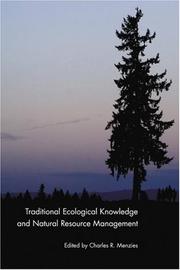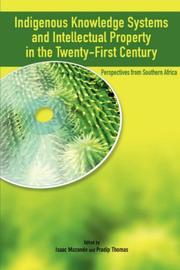| Listing 1 - 10 of 36 | << page >> |
Sort by
|
Book
ISBN: 9838618322 9789838618328 Publisher: [Place of publication not identified] Penerbit Usm
Abstract | Keywords | Export | Availability | Bookmark
 Loading...
Loading...Choose an application
- Reference Manager
- EndNote
- RefWorks (Direct export to RefWorks)
Traditional ecological knowledge --- Indigenous ecological knowledge --- Indigenous environmental knowledge --- T.E.K. (Traditional ecological knowledge) --- TEK (Traditional ecological knowledge) --- Traditional environmental knowledge --- Ethnoscience --- Experiential learning --- Biopiracy --- Ethnoecology

ISBN: 1280550740 9786610550746 0803207352 9780803207356 0803232462 9780803232464 0803283199 9780803283190 9781280550744 6610550743 Year: 2006 Publisher: Lincoln : Baltimore, Md. : University of Nebraska Press, Project MUSE,
Abstract | Keywords | Export | Availability | Bookmark
 Loading...
Loading...Choose an application
- Reference Manager
- EndNote
- RefWorks (Direct export to RefWorks)
A collection of essays on the ways Native communities have interacted with the environment. This work examines how traditional ecological knowledge (TEK) is taught and practised among Native communities. It focuses on the complex relationship between indigenous ecological practices and other ways of interacting with the environment.
Conservation of natural resources --- Traditional ecological knowledge --- Ethnoecology --- Indigenous ecological knowledge --- Indigenous environmental knowledge --- T.E.K. (Traditional ecological knowledge) --- TEK (Traditional ecological knowledge) --- Traditional environmental knowledge --- Ethnoscience --- Experiential learning --- Biopiracy --- Conservation of resources --- Natural resources --- Natural resources conservation --- Resources conservation, Natural --- Environmental protection --- Natural resources conservation areas --- Indigenous peoples --- Human ecology --- Conservation --- Ecology
Book
ISBN: 0773585397 9780773585393 9780773585409 0773585400 9780773543805 0773543805 Year: 2014 Publisher: Montreal
Abstract | Keywords | Export | Availability | Bookmark
 Loading...
Loading...Choose an application
- Reference Manager
- EndNote
- RefWorks (Direct export to RefWorks)
Traditional ecological knowledge --- Indians of North America --- American aborigines --- American Indians --- First Nations (North America) --- Indians of the United States --- Indigenous peoples --- Native Americans --- North American Indians --- Indigenous ecological knowledge --- Indigenous environmental knowledge --- T.E.K. (Traditional ecological knowledge) --- TEK (Traditional ecological knowledge) --- Traditional environmental knowledge --- Ethnoscience --- Experiential learning --- Biopiracy --- Ethnoecology --- Ethnobotany --- Culture --- Ethnology

ISBN: 1282901435 9786612901430 2869784066 2869783620 2869782802 9782869784062 9782869781948 2869781946 Year: 2007 Publisher: Dakar [Gaborone] [London, U.K.] Codesria University of Botswana World Association for Christian Communication
Abstract | Keywords | Export | Availability | Bookmark
 Loading...
Loading...Choose an application
- Reference Manager
- EndNote
- RefWorks (Direct export to RefWorks)
This volume discusses a number of issues on the contested nature of intellectual property rights (IPR) and Indigenous Knowledge Systems (IKS) in the context of Southern Africa. The issues addressed include the protection of folklore, IKS in a digital era, the valuation and safeguard of heritage sites, the need for appropriate IKS legislation, community based control of natural resources and the role played by traditional music in the maintenance of community. It is this extensive exploration of IKS from the vantage points of communication and culture, and explored in terms of policy, cultural
Indigenous peoples --- Traditional ecological knowledge --- Intellectual property --- Aboriginal peoples --- Aborigines --- Adivasis --- Indigenous populations --- Native peoples --- Native races --- Ethnology --- Indigenous ecological knowledge --- Indigenous environmental knowledge --- T.E.K. (Traditional ecological knowledge) --- TEK (Traditional ecological knowledge) --- Traditional environmental knowledge --- Ethnoscience --- Experiential learning --- Biopiracy --- Ethnoecology --- IP (Intellectual property) --- Proprietary rights --- Rights, Proprietary --- Intangible property --- Legal status, laws, etc. --- Law and legislation
Book
ISBN: 9956791458 9789956791453 9956791911 9789956791910 9789956791910 Year: 2014 Publisher: North West Region, Cameroon
Abstract | Keywords | Export | Availability | Bookmark
 Loading...
Loading...Choose an application
- Reference Manager
- EndNote
- RefWorks (Direct export to RefWorks)
The continent of Africa is richly endowed with diverse cultures, a body of indigenous knowledge and technologies. These bodies of knowledge and technologies that are indeed embodied in the diverse African cultures are as old as humankind. From time immemorial, they have been used to solve socio-economic, political, health, and environmental problems, and to respond to the development needs of Africans. Yet with the advent of colonialism and Western scientism, these African cultures, knowledges, and technologies have been despised and relegated to the periphery, to the detriment of the self-reliant development of Africans. It is out of this observation and realisation that this book was born. The book is an exploration of the practical problems resulting from Africa's encounter with Euro-colonialism, a reflection of the nexus between indigenous knowledge, culture, and development, and indeed a call for the revival and reinstitution of indigenous knowledge, not as a challenge to Western science, but a complementary form of knowledge necessary to steer and promote sustainable development in Africa and beyond. This is a valuable book for policy makers, institutional planners, practitioners and students of social anthropology, education, political and social ecology, and development, African and heritage studies.
Sustainable development --- Ethnoecology --- Traditional ecological knowledge --- Indigenous peoples --- Human ecology --- Indigenous ecological knowledge --- Indigenous environmental knowledge --- T.E.K. (Traditional ecological knowledge) --- TEK (Traditional ecological knowledge) --- Traditional environmental knowledge --- Ethnoscience --- Experiential learning --- Biopiracy --- Ecology --- Democratization --- Aboriginal peoples --- Aborigines --- Adivasis --- Indigenous populations --- Native peoples --- Native races --- Ethnology --- Democratic consolidation --- Democratic transition --- Political science --- New democracies --- Ghana --- Economic policy.
Book
ISBN: 9991642064 9789991642062 9789991642055 9991642056 Year: 2015 Publisher: Windhoek, Namibia : UNAN Press,
Abstract | Keywords | Export | Availability | Bookmark
 Loading...
Loading...Choose an application
- Reference Manager
- EndNote
- RefWorks (Direct export to RefWorks)
Traditional ecological knowledge --- Ethnobotany --- Ethnoscience --- Indigenous knowledge systems --- Traditional knowledge systems (Ethnology) --- Ethnology --- Science --- Indigenous peoples --- Ethnobiology --- Plants --- Human-plant relationships --- Indigenous ecological knowledge --- Indigenous environmental knowledge --- T.E.K. (Traditional ecological knowledge) --- TEK (Traditional ecological knowledge) --- Traditional environmental knowledge --- Experiential learning --- Biopiracy --- Ethnoecology
Book
ISBN: 0821444115 9780821444115 9780821419960 082141996X Year: 2012 Publisher: Athens, OH Ohio University Press
Abstract | Keywords | Export | Availability | Bookmark
 Loading...
Loading...Choose an application
- Reference Manager
- EndNote
- RefWorks (Direct export to RefWorks)
Indigenous knowledge has become a catchphrase in global struggles for environmental justice. Yet indigenous knowledges are often viewed, incorrectly, as pure and primordial cultural artifacts. This collection draws from African and North American cases to argue that the forms of knowledge identified as "indigenous" resulted from strategies to control environmental resources during and after colonial encounters. At times indigenous knowledges represented a "middle ground" of intellectual exchanges between colonizers and colonized; elsewhere, indigenous knowledges were defined through conflic
Traditional ecological knowledge --- Ethnoecology --- Indigenous ecological knowledge --- Indigenous environmental knowledge --- T.E.K. (Traditional ecological knowledge) --- TEK (Traditional ecological knowledge) --- Traditional environmental knowledge --- Ethnoscience --- Experiential learning --- Biopiracy --- Indigenous peoples --- Human ecology --- Ecology --- Aboriginal peoples --- Aborigines --- Adivasis --- Indigenous populations --- Native peoples --- Native races --- Ethnology
Book
ISBN: 1139950606 1139962299 1139949551 1139958054 1139961225 1107295238 1139959115 1139956981 1139960172 1107055334 1107686946 9781107055339 9781107295230 9781139960175 9781139958059 9781139959117 9781306857710 1306857716 9781107686946 Year: 2014 Publisher: Cambridge : Cambridge University Press,
Abstract | Keywords | Export | Availability | Bookmark
 Loading...
Loading...Choose an application
- Reference Manager
- EndNote
- RefWorks (Direct export to RefWorks)
After colonization, indigenous people faced an extractive property rights regime for both their land and knowledge. This book outlines that regime, and how the symbolic function of international intellectual property continues today to assist states to enclose indigenous peoples' knowledge. Drawing on more than 200 interviews, Peter Drahos examines the response of indigenous people to the colonizer's non-developmental property rights. The case studies reveal how they have adapted to the state's extractive order through a process of regulatory bricolage. In order to create a new developmental future for themselves, indigenous developmental networks have been forged - high trust networks that include partnerships with science. Intellectual Property, Indigenous People and their Knowledge argues for a developmental intellectual property order for indigenous people based on a combination of simple rules, principles and a process of regulatory convening.
Intellectual property. --- Indigenous peoples --- Traditional ecological knowledge. --- Intellectual property --- IP (Intellectual property) --- Proprietary rights --- Rights, Proprietary --- Intangible property --- Indigenous ecological knowledge --- Indigenous environmental knowledge --- T.E.K. (Traditional ecological knowledge) --- TEK (Traditional ecological knowledge) --- Traditional environmental knowledge --- Ethnoscience --- Experiential learning --- Biopiracy --- Ethnoecology --- Legal status, laws, etc. --- Law and legislation --- Ethnology --- Indigenous peoples - Legal status, laws, etc. --- Traditional ecological knowledge --- Australie
Book
ISBN: 0323916031 9780323916035 Year: 2022 Publisher: Amsterdam, Netherlands : Elsevier,
Abstract | Keywords | Export | Availability | Bookmark
 Loading...
Loading...Choose an application
- Reference Manager
- EndNote
- RefWorks (Direct export to RefWorks)
"Indigenous People and Nature: Insights for Social, Ecological, and Technological Sustainability examines today’s environmental challenges in light of traditional knowledge, linking insights from geography, population, and environment from a wide range of regions around the globe. Organized in four parts, the book describes the foundations of human geography and its current research challenges, the intersections between environment and cultural diversity, addressing various type of ecosystem services and their interaction with the environment, the impacts of sustainability practices used by indigenous culture on the ecosystem, and conservation ecology and environment management."--
Ethnoecology. --- Traditional ecological knowledge. --- Sustainability. --- Sustainability science --- Human ecology --- Social ecology --- Indigenous ecological knowledge --- Indigenous environmental knowledge --- T.E.K. (Traditional ecological knowledge) --- TEK (Traditional ecological knowledge) --- Traditional environmental knowledge --- Ethnoscience --- Experiential learning --- Biopiracy --- Ethnoecology --- Indigenous peoples --- Traditional ecological knowledge --- Ecology --- Conservation of Natural Resources --- Ecology. --- Conservation of Natural Resources.
Book
ISBN: 0817386556 9780817386559 9780817317867 0817317864 9780817358327 0817358323 Year: 2013 Publisher: Tuscaloosa The University of Alabama Press
Abstract | Keywords | Export | Availability | Bookmark
 Loading...
Loading...Choose an application
- Reference Manager
- EndNote
- RefWorks (Direct export to RefWorks)
Cultural Forests of the Amazon is a comprehensive and diverse account of how indigenous people transformed landscapes and managed resources in the most extensive region of tropical forests in the world. Until recently, most scholars and scientists, as well as the general public, thought indigenous people had a minimal impact on Amazon forests, once considered to be total wildernesses. William Balée's research, conducted over a span of three decades, shows a more complicated truth. In Cultural Forests of the Amazon, he argues that indigenous people,
Rain forest ecology --- Cultural landscapes --- Traditional ecological knowledge --- Ethnoecology --- Urubu Kaapor Indians --- Indigenous peoples --- Human ecology --- Cultural geography --- Landscapes --- Landscape archaeology --- Indigenous ecological knowledge --- Indigenous environmental knowledge --- T.E.K. (Traditional ecological knowledge) --- TEK (Traditional ecological knowledge) --- Traditional environmental knowledge --- Ethnoscience --- Experiential learning --- Biopiracy --- Gaviao Indians --- Ka'apor Indians --- Kaapor Indians --- Urubu Indians --- Urubus Indians --- Indians of South America --- Tenetehara Indians --- Social conditions. --- Philosophy. --- Ethnobotany. --- Ecology --- Amazon River Region --- Amazonia --- Environmental conditions. --- Aboriginal peoples --- Aborigines --- Adivasis --- Indigenous populations --- Native peoples --- Native races --- Ethnology
| Listing 1 - 10 of 36 | << page >> |
Sort by
|

 Search
Search Feedback
Feedback About UniCat
About UniCat  Help
Help News
News